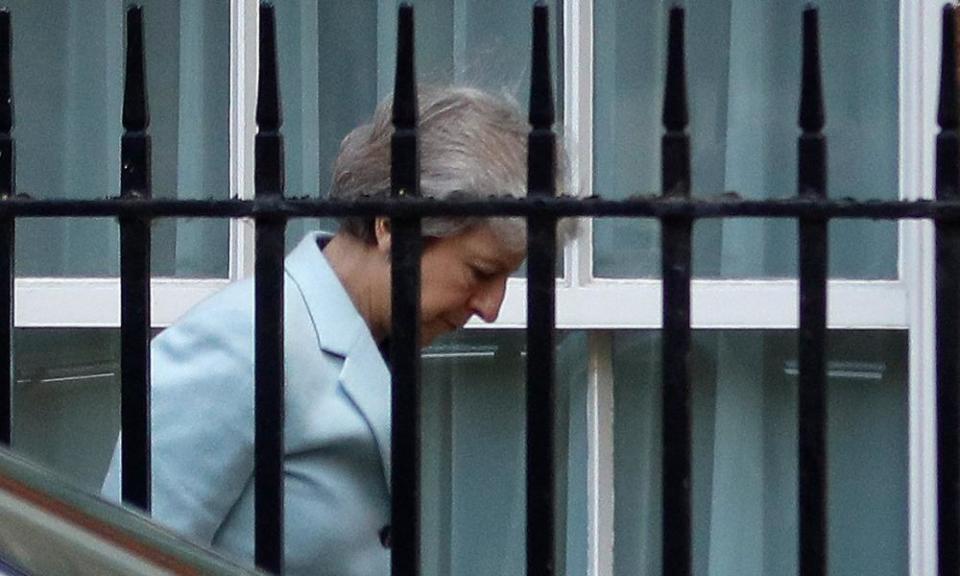'Sent packing': European press scathing on Theresa May's Salzburg summit

If she was hoping for a small crumb of comfort after what the vast majority of the British media saw as a “humiliating” and “disastrous” Salzburg summit, Theresa May did not find it in the pages of the European press.
Coverage of the meeting, at which May was bluntly informed that the core components of her Chequers plan “will not work”, was generally focused as much, if not more, on the EU’s disagreements over migration policy as it was on Brexit.
But the conclusion of the continental media, few of which made events in Salzburg their top story, was that the prime minister’s predicament was wholly predictable – the EU’s view of Chequers has been known since it was published, many pointed out – and entirely her problem. Commentators were downright scathing.
Sheila Sitalsing in the Dutch newspaper De Volkskrant said May had “stormed the European continent like a Don Quixote”, Chequers plan and Brexit conditions under her arm: Britain wanted to “keep playing footie and snacking at the canteen, without paying any subs, wearing the club strip or doing bar duty”.
The EU27 had “sent her packing in Salzburg”, Sitalsing said, where May had “desperately sought to win sympathy for a Brexit that would not send her population straight back to the Middle Ages”.
Her threat that if she was replaced things might get worse “did not impress” EU leaders – but May still seems to believe their hard line “is just a negotiating tactic”. She has got it all wrong: “Poor Theresa May. Poor United Kingdom.”
In the Spanish paper El Pais, Álvaro Imbernon Sainz said that since May took office in July 2016, her entire negotiating strategy had been “to postpone decision-making as much as possible, without putting together any kind of clear vision” – but the chickens were now coming home to roost.
“The problem is that the differences between the two sides are not technical, but on fundamental principles, and time is beginning to run out,” he said. “Like a bad student who puts off the moment to sit down and study, it’s now up to the UK to make up for lost time.”
Britain must “rediscover British pragmatism. For this, the Conservatives, and to a lesser extent Labour, must agree on a coherent and realistic position. Otherwise the historians of the future will be extremely hard on the current British political class”.
In France, Le Figaro said May had been “caught in the trap of her ‘it’s me or chaos’” strategy. The prime minister’s Brexit plan was “dead and buried”, the paper said, after she “put her allies up against the wall” by insisting a no deal was the only alternative. “Unfortunately, her plan has met unanimous opposition.”
For Le Monde, the EU27 had made plain that “the moment of truth” had come. The bloc’s leaders were “clearly singing from the same hymn sheet” and used the summit to sound the alarm, the paper said: “Brexit talks are in the closing straight – and the EU27 have, for the moment, no intention whatever of softening their stance.”
The meeting was above all aimed at “putting maximum pressure on the British prime minister a few days ahead of her party’s annual conference”, it said, adding that the October final deadline set by Donald Tusk, the European council president, for progress on the Irish border was clearly significant.
The paper quoted the French president, Emmanuel Macron, saying he had “perfectly summed up” the Europeans’ position on Brexit: Chequers “is not acceptable because it does not respect the integrity of the single market … Leaving the EU cannot be done without costs or consequences.”
Tusk “flatly rejected Britain’s plan for future EU-UK trade relations”, wrote Germany’s Die Welt, adding that the EU27 had “categorically thrown out” May’s Chequers plan quite simply “because it fears it would lead to unfair competition from British firms”. Brexit talks, the paper said, “are deadlocked”.
The Frankfurter Algemeine Zeitung took the same line, quoting Tusk as saying “May’s Brexit plan will not work” and that negotiations were now at a standstill after “both sides camped firmly on their positions and no agreement was reached”.
The Dutch newspaper NRC Handelsblad said the EU 27 had “approached the British prime minister positively, but given little away”. Britain had “high hopes” of the summit, it said, but “the harvest was meagre”.
The EU was walking a tightrope, the paper said: it had to be reasonably positive towards May while not budging, because: “British political drama is the greatest uncertainty around Brexit, and the horror scenario is that whatever is agreed with May proves worthless if she is replaced.”

 Yahoo News
Yahoo News 